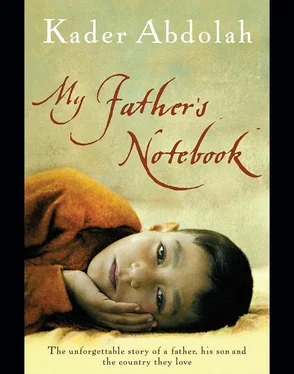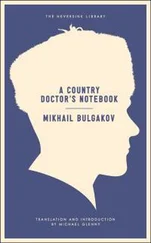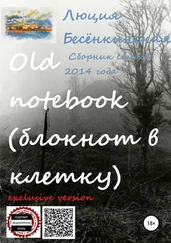She once spent a week with my family in Saffron Village. She reported that she’d had a wonderful time, that she’d quickly mastered our sign language and that she and my father had sat up late every night discussing the state of the world.
“The state of the world?” I asked.
“Yes. And we roared with laughter. I really laughed a lot.”
“About what?”
“Oh, I don’t know. I’d use the wrong signs and they’d burst out laughing.”
She never got another chance to visit my parents.
When Safa was in the final stages of pregnancy, she invited Golden Bell to our apartment. After that, when we had to move again for reasons of security, Golden Bell no longer knew how to get in touch with us.
In the dark time that followed the arrest of the party leaders, Safa and my daughter went to Kermanshah. She was planning to stay for a few weeks.
As fate would have it, those few weeks turned into years. By the time Safa was finally able to leave Kermanshah, her whole life had changed.
She was forced to move to a new country, where every-thing — from the front-door key to the bathroom mirror — was different. The teapot, the floor, the ceiling, even the ground beneath her feet, all were different.
A KLM flight brought her to Amsterdam, where I welcomed her with a bouquet of red, yellow and orange tulips. We took a train from the airport and then a taxi from the station to 21 Nieuwgracht.
But let’s go back to Tehran.
A week after the arrests we still didn’t know how badly the party had been hit or what the movement was going to do next.
While we waited, the secret police did their utmost to break the will of the party leaders, subjecting them to various forms of torture, in the hope that they would eventually bow down before the mullahs. The prisoners were thrown in separate cells and not allowed to sleep or sit. For five days and nights, they remained on their feet. Every time they nodded off, they got a bucket of ice-cold water thrown in their faces. They were given nothing to eat but a bowl of soup. Banned from using the toilets, they were forced to go in their pants. To weaken their resistance even further, their captors put tape recorders in their cells and forced them to listen night and day to Khomeini’s speeches. The torture went on until the prisoners agreed to kneel before the prison imam on TV, confess that they were Soviet spies and beg for forgiveness.
The regime wanted the opposition to see what it was up against.
Dr Pur Bahlul was arrested for the second time. Having spent years in prison under the shah, he was now flung in jail by the mullahs. He was forced to crawl to the prison imam on his knees and say, “La ilaha illa Allah. I repent. From now on I will follow you.”
They wanted millions of viewers to see that he was worthless, a mere worm hoping to become a human being, if only the imam would grant him forgiveness.
At home alone, I turned on the TV to watch the evening news. An old man appeared on the screen. A sick man with a pallid complexion. I knew who he was, or thought I did. There were a few seconds of deliberate silence meant to put the fear of God into the viewers. This ominous pause was followed by an icy voice, announcing that, after the news, the Soviet spy, Dr Pur Bahlul, would confess his crime.
The news didn’t last long, but it was the longest news broadcast I’d ever seen. The dentist finally appeared. I couldn’t believe it. The old Dr Pur Bahlul was dead and gone. The devil stared out from his eyes. He claimed that he was a spy who had betrayed his country. He said that from now on he was a follower of Khomeini, and that Khomeini was God’s earthly shadow. He repudiated his past, his party and his comrades, and knelt before the imam. Then he cried like a baby.
The party had been shattered, like an earthenware jar that falls to the ground. Hundreds of comrades were arrested, dozens were executed and hundreds more fled to the border areas and managed to escape.
During the shah’s regime you could count on the support of the people. Even total strangers would take you in. During the regime of the mullahs, all that changed.
The shah had governed in his own name, but the mullahs governed in the name of God. Khomeini himself appeared on television and said that God’s kingdom was in danger. He ordered his followers to keep a close watch on their neighbours.
Suddenly your country was no longer your own. You didn’t dare take a step. You had the feeling that people were watching you from behind their curtains.
After the revolution I wanted to make use of my new-found freedom to travel around the country with my father. To board a train with him and journey to the oil fields in the south, where the gas flames shot up into the air and the earth was dark with oil. Do you see that? Do you smell that? Beneath our feet, beneath this soil, there was oil. Lots of oil.
I wanted to show him the giant tankers that transported the oil to other countries, but I never got the chance. Although he always looked in wonderment at our gas stove, he never found out where those blue flames came from.
I wanted to take him to our marvellous Persian desert, where the sand glistened in the sun like gold. I wanted to ride across the desert with him on a camel, stop in a remote place and eat a simple meal with the villagers: a bit of camel’s milk and dry bread, a bowl of dates and a palmful of water that oozed gently from the heart of the earth.
I wanted to sleep beside him on the roof of a desert café, where you can reach up into the sky, with its unforgettable moon and millions of stars, and pull it over you like a velvety-blue blanket.
Unfortunately, I didn’t get the chance to do that, either.
I longed for just enough freedom to go with him to Isfahan, to visit the mosques he knew so well and talked about so often. I wanted to take him to the centuries-old Sheikh Lotfallah Mosque, and even though I’d stopped praying long ago, I would have stood beside him and prayed with him and for him.
But my deepest wish was to climb Mount Damavand with my father.
Mount Damavand is the highest mountain in Iran and also the most difficult to climb. People refer to it as the roof of Persia. I no longer remember whether it’s 18,934 or 18,349 feet high, but it has one very distinct feature: one side of the peak is always covered with a thick layer of ice and snow, and the other side is always warm. Once you’re at the top, you can see that the summit is shaped like a bowl — a great, big, warm bowl. It’s actually the mouth of a once-active volcano. If you put your ear to the ground, you can hear the volcano breathing.
It’s dangerous to climb Mount Damavand in the winter. The best time is spring, when the storms have died down and the ice has not quite melted. Then lots of mountain climbers cautiously make the ascent. As soon as they leave the frozen mass of snow behind, they begin to sing love songs, such as this one:
To goft keh gol dar ayeh mu biyayom.
Gel-e alam dar amad kiy miayi?
You said you’d come to me the moment the flowers blossomed.
Now that every flower has blossomed, when can I expect you?
At the time of Dr Pur Bahlul’s televised “confession”, I didn’t know what was going to happen to me. Would I be arrested, too? Would I end up in jail? Would I crawl to the mullahs on my hands and knees and beg them for forgiveness? I didn’t know how much danger I was in, but I did know this: I didn’t want to flee. My comrades and I might be required to lead the party through these difficult times.
First I had to leave my flat and go into hiding for a few days, to avoid falling into the hands of the secret police. Then I’d come back and see what was left of the party. I’d go looking for the rest of my comrades, so we could pick up the pieces. In the meantime, I had to get out fast. But where was I to go?
Читать дальше












